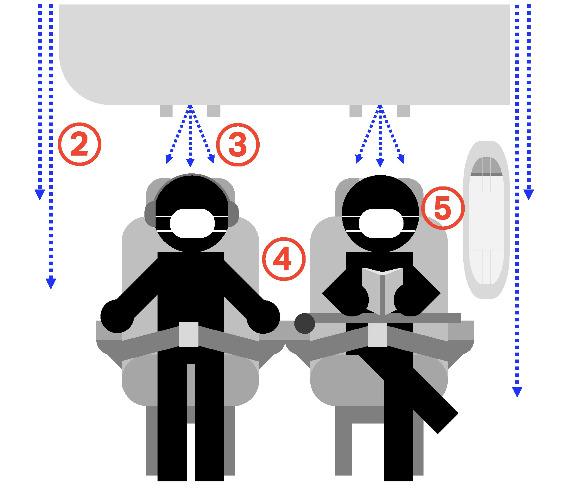QTRAVEL – Inflight COVID-19 transmission is extremely rare. Since the start of 2020, there have been 44 confirmed or possible cases of COVID-19 associated with a flight. Over the same period, some 1.2 billion passengers have traveled. That equates to one case for every 27 million travelers.

Dr. David Powell, IATA’s Medical Advisor, calls the figures “extremely reassuring.” “Furthermore, the vast majority of published cases occurred before the wearing of face coverings inflight became widespread,” he notes.
There are several reasons why this is the case:
Seating position – Most of the time on board, you are seated facing forward rather than facing another person. This makes a big difference in terms of the chance of breathing in someone else’s expelled breath.
Seat backs – A further barrier to COVID-19 spread is that high seatbacks act as a solid barrier.
High airflow rate – Research has shown that the airflow in an aircraft (from ceiling to floor) is less conductive to droplet spread than other similar environments or modes of transport.
Air exchange – Modern jet aircraft deliver high airflow and replacement rates, combined with hospital-grade High-Efficiency Particulate Air (HEPA) filters that are 99.9+% effective at removing viruses, bacteria and fungi. Cabin air is exchanged every 2-3 minutes.
 Unlike other modes of transport, the aircraft cabin environment makes the transmission of viruses difficult and we have seen a low occurrence of onboard transmission.
Unlike other modes of transport, the aircraft cabin environment makes the transmission of viruses difficult and we have seen a low occurrence of onboard transmission.
It’s unlikely an infected passenger will even get to sit next to you. Government health screening and departure biosafety measures minimize this.
Virus-carrying droplets are unlikely to reach you:
- Cabin air flows downwards and is fully renewed with fresh air every 2-3 minutes.
- Personal overhead ventilation can strengthen airflow downward.
- All passengers face forwards, not at each other.
- Masks are a proven and effective barrier. They should be worn throughout the travel process.
Alexandre de Juniac, IATA’s Director General and CEO, accepts that there is no “single silver-bullet measure” that will make air travel 100% safe in the age of COVID-19. “But the combination of measures that are being put in place is reassuring travelers the world over that COVID-19 has not defeated their freedom to fly,” he says. “Nothing is completely risk-free. But with just 44 published cases of potential inflight COVID-19 transmission among 1.2 billion travelers, the risk of contracting the virus on board appears to be in the same category as being struck by lightning.
“The detailed research of the aircraft manufacturers demonstrates that combining the aircraft’s existing design features with mask-wearing creates a low-risk environment for COVID-19 transmission,” he concludes. “As always, airlines, manufacturers and every entity involved in aviation will be guided by science and global best practices to keep flying safe for passengers and crew.”
COVID-19 Travel Regulations Map* (powered by Timatic)
Requirements to enter Costa Rica
- A “Health Pass” form must be completed before the departure of the flight to Costa Rica. This will generate a QR code 48 hours prior to departure which must be presented upon arrival. The form can be obtained at https://salud.go.cr
- Passengers must have travel insurance coverage for Covid-19 treatment and accommodation costs. This does not apply to nationals. Legal residents of Costa Rica must be up-to-date with their payments to the Caja Costarricense de Seguro Social, if not, must have travel insurance.
- Passengers arriving by air must arrive at the Aeropuerto Internacional Juan Santamaría in San Jose (SJO) and the Aeropuerto Internacional Daniel Oduber Quirós in Liberia (LIR) airports.
- Maritime: Nationals, residents, tourists may enter by yacht or sailboat only by way of the following marinas: Golfito, Los Sueños, Pez Vela, Banana Bay and Papagayo. The entry of tourists in vessels that are not yachts or sailboats will not be allowed, said measure will remain in force until December 31, 2020.
- Terrestrial and fluvial: Only nationals and legal residents are permitted entry. The entry of tourists through this route will not be allowed. The measure will remain in force until December 31, 2020.
- Legal residents who enter by land must comply with a sanitary isolation order for a period of 14 days. Non-compliance to a health order involves a fine of a base salary, which currently corresponds to the sum of ¢464,300 colones. See Foreigner residents in Costa Rica can now enter by land
- Expired residency permits (DIMEX) with category “permanente” are extended until January 11, 2021; with categories “temporales” and “especiales” which expired after December 18, 2019, are extended until January 11, 2021; with category “estancias” which expired after March 17, 2020, are extended until February 12, 2021.


